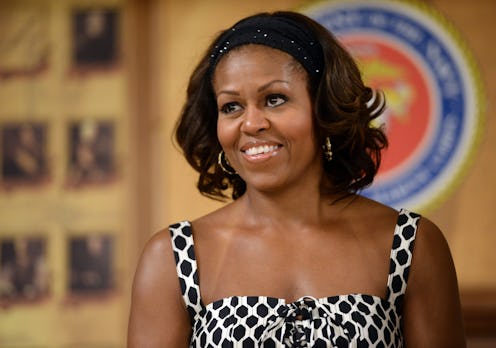News
7 Powerful FLOTUS Quotes On Race
President Obama has always been referred to as the first black president of the United States, but it's sometimes overlooked that Michelle is the first black First Lady as well. FLOTUS spoke out about the racial challenges she's faced during a graduation speech at Tuskegee University in Alabama on Saturday, detailing the negative remarks and treatment she's experienced over the years. Obama doesn't talk about race very often, but when she does, it's extremely powerful. Just as her husband has a lot of potential to positively influence race relations in the U.S., FLOTUS' candid comments on the subject have a big impact.
Obama told the new graduates of Tuskegee University, a historically black college, that people will make assumptions about them based on their "limited notion of the world" and that she and her husband know how frustrating it can be. She said:
But, graduates, today, I want to be very clear that those feelings are not an excuse to just throw up our hands and give up... They are not an excuse to lose hope. To succumb to feelings of despair and anger only means that in the end, we lose.
It's not the first time Obama has spoken out about race relations. Here are some other powerful comments she's made...
In her senior year thesis at Princeton, titled "Princeton-Educated Blacks and the Black Community," Obama wrote:
My experiences at Princeton have made me far more aware of my "blackness" than ever before. I have found that at Princeton, no matter how liberal and open-minded some of my white professors and classmates try to be toward me, I sometimes feel like a visitor on campus; as if I really don't belong. Regardless of the circumstances under which I interact with whites at Princeton, it often seems as if, to them, I will always be Black first and a student second.
These experiences have made it apparent to me that the path I have chosen to follow by attending Princeton will likely lead to my further integration and/or assimilation into a White cultural and social structure that will only allow me to remain on the periphery of society; never becoming a full participant.
In an interview with People on how the Obamas deal with racist experiences, FLOTUS said:
I think people forget that we've lived in the White House for six years. Before that, Barack Obama was a black man that lived on the South Side of Chicago, who had his share of troubles catching cabs.
I tell this story – I mean, even as the first lady – during that wonderfully publicized trip I took to Target, not highly disguised, the only person who came up to me in the store was a woman who asked me to help her take something off a shelf. Because she didn't see me as the first lady, she saw me as someone who could help her. Those kinds of things happen in life. So it isn't anything new.
While speaking at the BET's Black Girls Rock in April, Obama said:
When I was a girl, I had parents who loved me and believed in me, but those doubts still worked their way inside my head and my heart, and I was always worried about something. Does my hair look right? Am I too tall? Do I raise my hand too much in class? So when folks said that a girl like me shouldn’t aspire to go to the very best colleges in this country I thought, "Maybe they’re right." But eventually I learned that each of those doubts were like a little test, a challenge, that either I could shrink away from or rise up to meet and I decided to rise.
Yes, I decided to rewrite those tired old scripts that define too many of us. I decided that I wasn’t bossy — I was confident and strong. I wasn’t loud — I was a young woman with something important to say and when I looked into the mirror I saw a tall, and smart and beautiful black girl. And that more than anything else is what I want for you, I want you to live life on your own terms... but anyone who’s achieved anything in life knows that challenges and failures are necessary components of success.
I need you to understand that we are the women who marched from cotton fields into fields of medicine ... politics ... entertainment. We have found a way to march into a White House.
At a private memorial ceremony for Maya Angelou, Obama spoke about the poet's influence on young black girls, herself included. She said:
The first time I read Phenomenal Woman, I was struck by how she celebrated black women’s beauty like no one had ever dared to before. ... For me, that was the power of Maya Angelou’s words — words so powerful that they carried a little black girl from the South Side of Chicago all the way to the White House.
During a 2008 speech encouraging students to take advantage of diversity on campus, FLOTUS said:
You’re not talking to each other, taking advantage that you’re in this diverse community because sometimes it’s easier to hold onto your own stereotypes and misconceptions, it makes you feel justified in your own ignorance. That’s America. So the challenge for us is, are we ready for change?
In a 2007 interview on 60 Minutes, Obama said:
As a black man, you know, Barack can get shot going to the gas station.
Images: Getty Images (4)
